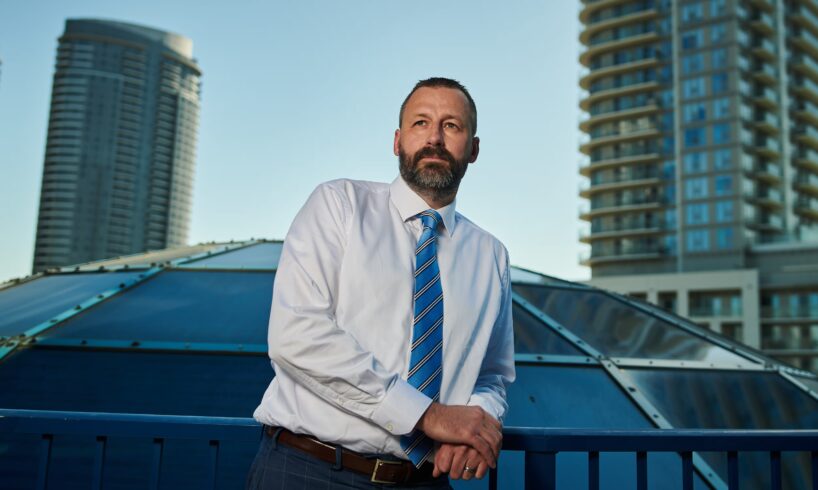
Open this photo in gallery:
Toronto Police Association President Clayton Campbell’s union represents nearly 6,000 officers.Sammy Kogan/The Globe and Mail
The head of Canada’s largest municipal police union is pushing the federal government for tough-on-crime measures, including stiffer sentences for young offenders, after a series of violent crimes allegedly involving youth suspects.
Toronto Police Association (TPA) president Clayton Campbell, whose union represents nearly 6,000 officers, says recent homicides illustrate the need to overhaul the legislation that governs how the criminal-justice system treats youth who commit violent crimes.
“Sixteen- or 17-year-olds that murder someone or shoot someone in the streets of Toronto, they’re almost an adult. I think we need to change the Youth Criminal Justice Act so they can be treated as an adult,” Mr. Campbell told The Globe and Mail in a recent interview.
The YCJA, passed by a Liberal government more than 20 years ago, allows youth to be sentenced as adults but only in very rare cases.
Carney will introduce legislation next month to tighten bail system
The statute has dramatically reduced Canada’s youth jail and prison population by strongly discouraging courts from incarcerating young people.
However, in recent months, a string of killings in the Greater Toronto Area has prompted calls for the federal government to revisit the legislation.
In August, JahVai Roy, an eight-year-old boy, was shot dead in his bed by a stray bullet, which authorities allege was fired by one of three accused teenagers, two of them under 18.
Also that month, in an unrelated case, a man who was sleeping outside of City Hall was bludgeoned before dawn − he later died and a 12-year-old boy has been arrested as a murder suspect in that case.
Toronto Police Chief Myron Demkiw, who has called for action to address youth violence, told his civilian police board in September that the number of overall homicides and shootings have dropped since last year.
Statistics Canada crime data show that in most years, Toronto is not an unusually violent city by Canadian standards and that youth suspects in homicide cases are in line with national averages.
However, Toronto Police commanders say that, so far, in 2025 youth suspects have been implicated in about one in every four homicides in the city – and that this is unusually high.
Data from the police force show that by September, 13 youth had been charged in connection with homicides this year.
Premier Doug Ford told reporters in September that he has pressed Prime Minister Mark Carney to tighten Canada’s legislation for young offenders.
The police association’s Mr. Campbell says he is finding that Liberal MPs seem more receptive since the spring federal election to hearing his union’s concerns about crime.
Mr. Campbell said he is planning to meet Toronto Liberal MPs in Ottawa later this month. He addressed the House of Commons justice committee on Sept. 25 along with the heads of two other police unions.
In a Sept. 4 letter to Justice Minister Sean Fraser, obtained by The Globe, Mr. Campbell said legislative changes to the YCJA are needed to allow Crown prosecutors to “overcome the presumption of the diminished moral blameworthiness” in cases of serious crimes involving youth suspects.
The letter from the union urges stiffer sentences for youths convicted of weapons offences, human trafficking, robbery and sexual assault.
Mr. Campbell also calls in the letter for other changes, including the creation of a national system to keep tabs on seemingly lenient judges, described in his letter as an “internal tracking system that identifies justices and judges that consistently release accused who seriously reoffend.”
A spokeswoman for the Justice Minister did not address questions from The Globe about the union’s proposals or possible changes to the YCJA.
In a statement, Lola Dandybaeva said “we will deliver legislation to crack down on violent and organized crime.”
“We have been working closely with partners in law enforcement, and that engagement has included constructive meetings with the Toronto Police Association,” she said.
Historically, the TPA tended to focus on more local issues but in recent years, the union has gained traction with higher levels of government.
Mr. Campbell, whose association backed Mr. Ford after the Premier called a snap election in February, said he routinely speaks to top Ontario officials.
Some criminal-justice observers say the federal government should not put much stock in a police-union’s proposals for legislative changes, given that there has not been a sustained surge in youth violence since the YCJA came into effect.
“The idea that there is a marked uptick in violent youth crime as a result of this legislation is not grounded,” said Shakir Rahim, director of the criminal-justice program at the Canadian Civil Liberties Association. “I think it would be a terrible mistake to sort of make policy on the fly when it comes to the youth criminal justice system.”
While police unions are stakeholders in criminal law, they often gravitate to simple solutions to complex problems, said Catherine Latimer, executive director of the John Howard Society. The national non-profit organization advocates for the rights of prisoners.
“It looks to me like the focus of the union proposals are all about trying to make it easier for them to get convictions” and for people to be incarcerated for longer periods, said Ms. Latimer, who worked with the federal government to develop the YCJA.





